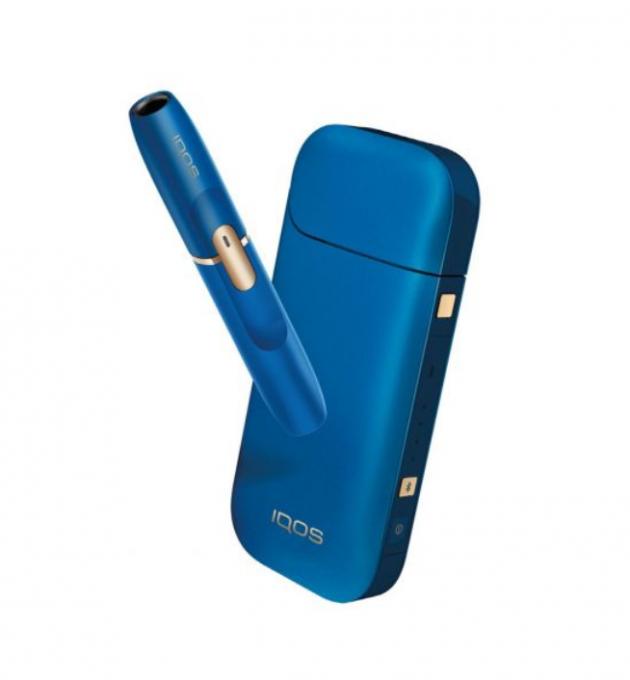Domestic and international tobacco companies are rolling out their heat-not-burn cigarettes in the Korean market with Philip Morris Friday launching a Metallic Blue edition of the iQOS, dubbed the “iPhone of e-cigs.”

Metallic Blue cigarettes, priced at 120,000 won ($110), will be sold in stores both online and offline and retail chains such as E-Mart, the company said. The recent limited edition follows the iQOS Ruby edition launched in November.
Philip Morris International first launched the tobacco heating system in Korea in May last year. Competition has since intensified with BAT Korea launching its “Glo” device and accompanying e-cigs called “Dunhill Neostiks” in August. Then came KT&G in November, launching its “Lil” device in the market.
The rollout of e-cigs in the market coincides with the drop in sales of regular cigarettes in recent years. Government data showed cigarette sales fell by nearly 4 percent last year from 2016 following the government’s launch of a national anti-smoking campaign.
According to the government, South Korea increased the price of cigarettes by 80 percent from 2,500 won to 4,500 won per pack in 2015 to promote the public health. Advertising laws also required tobacco companies to attach graphic warnings on cigarette packs to warn against the health consequences of smoking.
With rising cigarette prices and a more health-conscientious population, some Korean consumers have been turning to electronic cigarettes as what seems to be a “healthier” alternative.
But how much healthier e-cigs are compared to regular cigarettes is at the center of debate after an advisory committee of the U.S. Food and Drug Administration last month shut down Philip Morris International’s application to market iQOS as less risky than regular cigarettes.
Philip Morris had provided the federal health agency with clinical trial “evidence,” arguing that the sleek, pen-like device, which does not burn tobacco but heats it, reduces users’ exposure to carcinogens, and the possibilities of disease and death compared to ordinary cigarettes.
In December, however, Reuters identified shortcomings in the training and professionalism of some investigators involved in the clinical trials. And former Philip Morris employees and contractors also pointed out irregularities in the experiments aimed to prove iQOS as safer.
And near the end of January, the nine-member FDA panel unanimously voted down Philip Morris’s claims that iQOS could cut the smokers’ risk of tobacco-related diseases. The board also decided against the claim that iQOS is less harmful than smoking in a 5-4 vote, although it acknowledged that the e-cig device does reduce exposure to carcinogens.
The recommendations of the advisory panel are not binding, but the FDA often follows them.
The tobacco firm, famous for its Marlboro brand cigarettes, submitted the iQOS research methods and partial data to the Korean Ministry of Food and Drug Safety, too, in November.
“It’s true that we cannot say that iQOS is less harmful than normal cigarettes. This is a part that will need further evaluation,” said a Philip Morris Korea official.
"We asked for the authorization of a modified risk tobacco product (MRTP) to the FDA, but we did not do so in Korea because the Ministry of Food and Safety does not have a similar application process.”
The Korean ministry said it would analyze heat-not-burn products to determine whether it can reduce harmful chemicals and how much.
“Because this is a relatively new product, the ministry may have to create new regulations or systems to deal with e-cigarettes,” the official added.
Meanwhile, the government has also swung back and forth on the consumption tax rate for e-cigs. South Korea had first categorized e-cigs differently from ordinary cigarettes and levied a lower tax rate on them. In October, however, the National Assembly’s Finance Committee passed a bill that calls for imposing the same tax rate on e-cigs as those on regular cigarettes.
“HNB cigarettes should be categorized as conventional cigarettes as they use the same tobacco and emit smoke, which is similar to the harmful smoke released by traditional cigarettes,” Rep. Kim Kwang-lim of the opposition Liberty Korea Party was quoted as saying by the Vaping Post.
The government has since raised the consumption tax on e-cigs to 897 won from 538 won, which is still below the 1,007 won levied on ordinary cigarettes. Philip Morris responded by increasing the price of HEETS, the tobacco units used within iQOS, by nearly 4.7 percent to 4,500 won ($4.13).
Although the government still examines iQOS data, e-cig companies are competing to grab the larger slice of the domestic market. KT&G said Wednesday it would expand the sales networks of its “Lil” cigarettes to convenience stores, such as CU and GS25.

